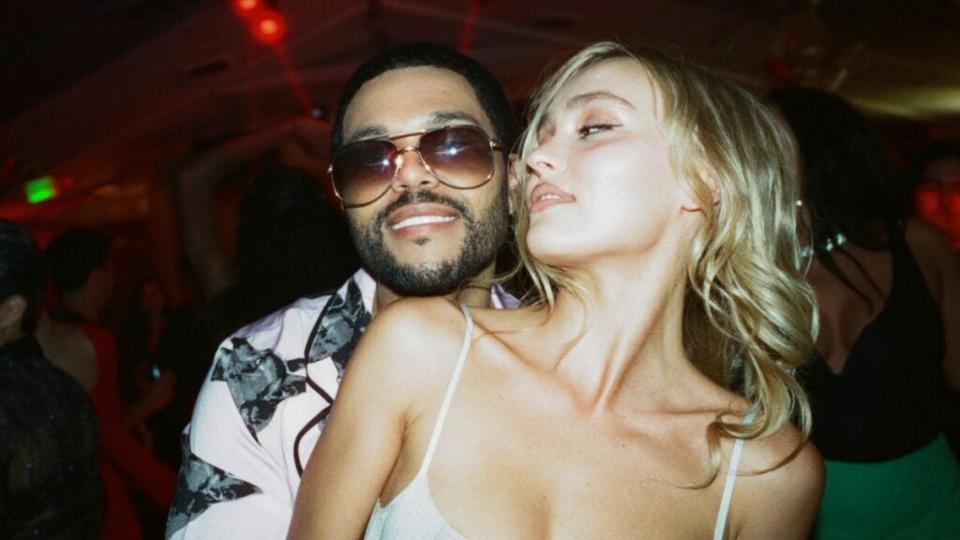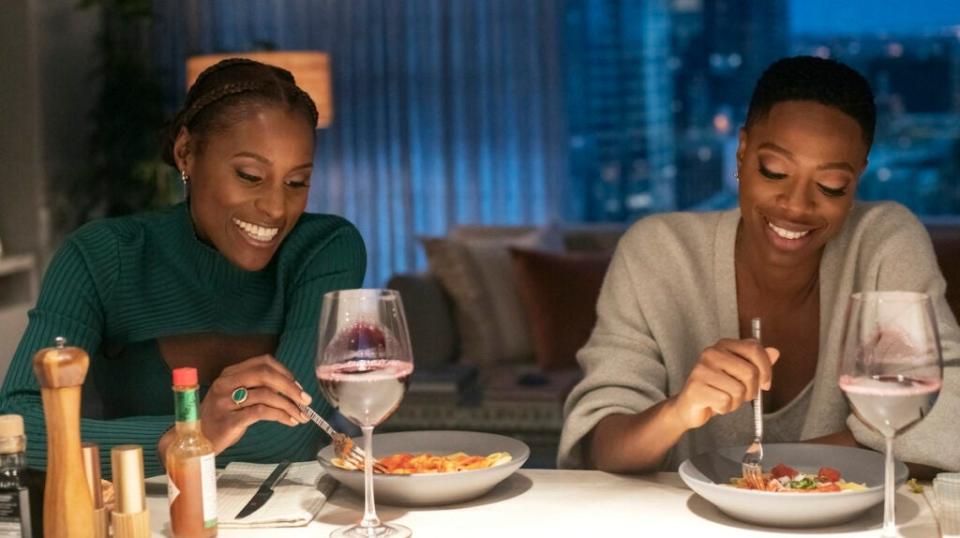HBO’s ‘The Idol’ Is ‘Hostile to Feminism,’ Media Experts Say
- Oops!Something went wrong.Please try again later.
“Regressive.” “Hostile to feminism.” “A male fantasy.” “Totally disempowered.” “Women as toilet paper.” “Sleazy and tawdry.” “Porny.”
Four weeks in, that’s how “The Idol” — HBO’s latest and one of its most scandalous Sunday night shows — was described to TheWrap by leading feminist voices who specialize in media. On the heels of the Parents and Television Media Council calling for HBO to cancel the series, it’s not just special interest parenting groups that have questioned the premium cable network’s decision to air the drama from “Euphoria” creator Sam Levinson, Abel “The Weeknd” Tesfaye and Reza Fahim.
“If we’re going to have our cake and eat it too, in this way of exploiting female sexuality in order to comment on the exploitation of female sexuality, I’m not sure that’s a super important message right now,” Jennifer Keishin Armstrong, author of “When Women Invented Television” and “Pop Star Goddesses,” told TheWrap. “It might be a huge reason this is not landing.”
She wasn’t the only one to use that analogy. “Brainwashed: Sex-Camera-Power” director Nina Menkes referred to the series as “laughing at feminism” and “women as toilet paper.”
Also Read:
9 Most Shocking Moments From ‘The Idol’ Episode 4
“The Idol” centers on Jocelyn (Lily-Rose Depp), a pop star who struggles to relaunch her imploding music career after a mental health breakdown derailed her last tour, leaning on nightclub owner Tedros (Tesfaye), whose sinister past and shady tactics threaten to tear down the fragile remnants of her fame.
While the HBO drama debuted to scandalized audiences at its Cannes premiere in May, with accusations of giving life to disturbing male fantasies — from Jocelyn masturbating while she chokes herself to Tedros depriving her of oxygen in an effort to give her music an edge — the series has amped up the shock factor while deepening its troublesome depiction of the twisted relationship between the two leads. Episode 4 featured a graphic scene in which Tedros pleasures (or, depending on your view, assaults) a blindfolded Jocelyn while she records a new song in the studio to give her sound an edge while staff and friends look on.
With just one episode left in its five-episode season, it’s clear that any agency that Jocelyn had over her own life has been taken away by Tedros, who intimidates and bullies anyone in his way as Jocelyn meagerly observes.
“It’s not just that it’s a male fantasy, but it’s hostile to feminism,” Menkes told TheWrap. “They’re pretending that Jocelyn is the protagonist, but they totally disempower her. She’s sexualized as an object in every single shot. And the whole first episode ends with [Tedros] mansplain[ing] about singing, about sex, about everything.”
An HBO spokesperson for the show declined to comment for this story.

In the series, Jocelyn is unquestionably a sexual being. The first episode revolves around a photo of the pop star with ejaculate on her face, and later in the season she debuts a new song that opens with a woman — presumably her — moaning. As Menkes sees it, “The Idol” attempts to present Jocelyn’s self-objectification as a form of self-empowerment in the era of social media and Instagram.
“What’s wrong with that?” Menkes asked. “What’s wrong with it is extensive research has shown that girls who get involved in that have higher rates of depression, higher rates of body dysmorphia, suicidal ideation and even actual suicide. That’s a two-to-one ratio with boys of the same age.”
Joi Carr, a professor of English and film studies at Pepperdine University, was more forgiving in her analysis of the series, likening Jocelyn’s construction as an “idol” to the femme fatale trope of the past while her psychological darkness embodies a Martin Scorsese-esque character.
“She’s a 21st century woman who has complex psychology that shows up on screen,” Carr told TheWrap. “However, it’s regressive because she really isn’t functioning out of her own agency. She is a puppet in many ways because she lacks clarity about who she is as a person — her soul is wrestling with her identity [and] she doesn’t really know who she is. She just knows that her beauty is the way she can move in the world and seemingly have control — which makes her dangerous because she is actually lost.”
Also Read:
HBO’s ‘The Idol’ Episode 2 Down 12.4% From Debut
The femme fatale visual language of the series and its connection to film noir was also noted by Andrea Press, chair of the University of Virginia media studies department. Typically, these movies were about “overpowering, heterosexual, female sexuality.”
But even though examining this era of filmmaking is her expertise, Press questioned the motifs, saying, “They had to go back to Hollywood of the ‘40s. Is that really what you want to do at this moment? In this moment of gender transition, is that really appropriate? Is that really going to give you what you need for this portrayal? I thought it was curious.”
Though the organization approached the series from an entirely different angle, the concerns of the conservative Parents Television and Media Council actually mirrored those of the feminist experts interviewed.
“It seemed to be entirely for the male gaze,” Melissa Henson, vice president of the organization, told TheWrap. “It just came across as kind of sleazy and tawdry and not at all engaging to me.”
Henson’s criticisms bring up a pressing question about Levinson’s latest series: How does this series fit in with HBO’s legacy of cutting-edge portrayals of female sexuality?
In the ‘90s, the network paved the way with “Sex and the City.” In the 2000s, it pressed the sexual conversation yet again with Lena Dunham’s “Girls” and in the 2010s with Issa Rae’s “Insecure.” These shows pointedly came from a female gaze and focused on the awkwardness of relationships and sex.

Thematically, Carr argued that “The Idol” feels as though it fits in with the premium cable network’s brand. “HBO is often good at allowing women to have clarity about who they are as people, right? In this case, [Jocelyn] is wrestling with who she is and how she loves herself or doesn’t love herself,” she said. “Like in ‘Sex and the City,’ they’re all wrestling with how they love themselves.”
But when it comes to the sexual elements of the series, Armstrong had a more difficult time grappling with the drama’s place in the brand’s history. In fact, the only show the author could think to compare “The Idol” to was “Game of Thrones,” which was criticized throughout its eight-season run for its graphic rape scenes. Even then, these scenes were never intentionally erotic, and the argument for them was to shed light on the motivations of the series’ female characters.
“They’ve always been on the cutting edge of sex, for sure,” Armstrong said, referencing the era before streaming when channels like HBO, Cinemax and Showtime were the only ways to see nudity on TV. “They’ve always been pushing that boundary specifically because they could and it was kind of almost an advantage they had.”
But in the nudity-filled age of streaming, that advantage is long gone.
Also Read:
A Little Sex, Please? Hollywood Says No Thank You
“I guess one could wonder, then, why this now?” Armstrong asked. “Is it an attempt to get even more chatter? Is it everybody just being like, ‘We don’t know what’s going on anymore in the television landscape?’ But it’s not an advantage.”
Armstrong added: “Maybe it’s that feeling of wanting to push things and push things and see how far you could go.”
“The Idol” wasn’t cheap for HBO either. The original project — which was directed by “The Girlfriend Experience” director Amy Seimetz — totaled an estimated cost of $54 to $75 million, according to a report from Rolling Stone. Then the project underwent a major overhaul with significant reshoots when Seimetz exited the series, prompting Levinson and Tesfaye to reimagine the project, which Tesfaye reportedly said was “leaning too much into a ‘female perspective.’”
“Think about the amount of money that is being thrown at a project to make sure there’s no feminist elements that dare to poke through,” Menkes said.
As the season finale for “The Idol” looms, not all hope is lost for the series to redeem itself — and for Jocelyn to grab ahold of her agency — as Da’Vine Joy Randolph, who plays Jocelyn’s manager Destiny in the series, teased that the series would “completely turn on its head” in the conclusion of the season.
“The man [created] ‘Euphoria,’” Randolph told TheWrap of Levinson, adding that the discourse surrounding the show will “reveal something different.” “You really think it’s gonna be surface and obvious? No, there’s a spin — there’s a huge, huge spin.”
For Carr, who notes that Jocelyn’s effort to stay true to herself despite feeling lost touches on contemporary themes, “The Idol” could turn around with an acknowledgement that “clinging on to whatever identity is mirrored toward her” is not a healthy nor productive way to work through her pain and find her authentic self.
“I think the writers and creators know that this woman is wrestling with trying to become an image instead of a person,” Carr said. “I think they understand the complexity of her character [and] that she is unhealthy, but if the narrative starts to judge her and engender an understanding that she isn’t healthy and that she is a regressive form of femininity and empowerment, that would help shift the arc and make it feel more progressive.”
“The Idol” season finale premieres Sunday at 9 p.m. ET on HBO and streams on Max.
Also Read:
Beyond Sex Scenes: The Role of Intimacy Coordinators Has Expanded

